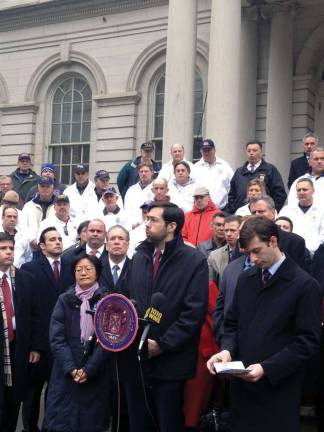Adding Cancer to the Zadroga Bill

Since 2009, Ray Pfeifer, a firefighter at Engine 40 in Manhattan and married father of two, has been battling a diagnosis of stage four kidney cancer that spread to his bones. Now, two years later, Pfeifer has undergone multiple surgeries, lost portions of his legs and hip and a kidney and is still fighting for his life.
Pfeifer believes his cancer is linked to the seven months he spent helping with the recovery and clean-up efforts at ground zero, where he inhaled what he described as a "toxic soup." Unfortunately, among his 9/11 recovery worker comrades, Pfeifer's cancer diagnosis is seemingly not uncommon.
On Wednesday, Feb. 15, dozens of firefighters and police officers who worked during and in the aftermath of 9/11 gathered in white jackets on the steps of City Hall in a show of solidarity.
Pfeifer and the other first responders, along with local politicians State Sen. Daniel Squadron, Manhattan Borough President Scott Stringer and City Council Member Margaret Chin, were gathered to urge Mayor Michael Bloomberg to release a list of the names of first responders on 9/11, which they hoped would help extend medical aid under the Zadroga Act to those afflicted with cancer.
The Zadroga Act, a bill that went into effect mid-2011, is meant to alleviate the burden of medical expenses incurred as a result of 9/11 related sicknesses. The bill is named after the now-deceased James Zadroga, a NYPD officer who died of respiratory disease attributed to his time spent at ground zero post-9/11.
The act is meant to cover a variety of 9/11-related conditions, according to the National Institute of Occupational Safety and Health, including aerodigestive disorders like chronic coughing and asthma, as well as mental health problems such as post traumatic stress disorder and depression, but does not yet include support for any form of cancer.
Because of the complex nature of cancer, the World Trade Center Health Program, a committee headed by Dr. John Howard, was commissioned to study the link between the environment and cancer in people who lived, worked and went to school in Lower Manhattan on and post-Sept. 11, 2001.
On July 26, 2011, the Center for Disease Control released those results. The committee's initial findings, that "insufficient evidence exists at this time to propose a rule to add cancer" to the Zadroga Act, has many members of the city urging for greater transparency in future studies.
"In light of all that we know, all that we've seen and all of the heartbreaking stories that we've heard, I find it staggering that the city refuses to recognize that responders have been exposed to cancer-causing toxic dust," said Chin.
"The government has an obligation to cover cancer treatments because they told first responders that the air was safe when it was full of carcinogens. There was not enough testing, there were not enough precautions, there was not enough information available about the deadly toxic dust that consumed our neighborhood," she continued.
Chin and other politicians are asking for the disclosure of the names of first responders so they can be given to the WTC Health Program along with a new study, conducted by FDNY Chief Medical Officer Dr. David Prezant that was published in The Lancet medical journal.
City Council members believe a conclusive link between cancer diagnosis and first responding on 9/11 can be made, especially in light of Prezant's findings, which reveal "about 38 new cancers in the seven years that [they] studied [first responder firefighters]," and offers strong evidence that was not available to the WTC Health Program in July.
Squadron also urged for the disclosure of information from the mayor's office, saying, "In the years immediately after 9/11, misinformation and bureaucracy caused delays that may have cost lives. Now, 10 years out, the misinformation and bureaucracy must end."
With the WTC Health Program's second review of whether to add cancer to the covered conditions due for submission on March 2, officials hope to be able to provide Howard and his colleagues with enough information to add a cancer provision to the Zadroga Act, which is set to expire in 2015.